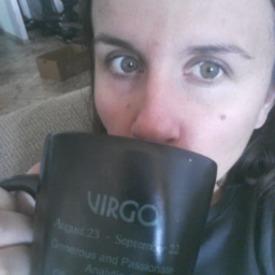Fed Up with Food Fear-Mongering
Options
Replies
-
Too much bold type. It's just too much boldness.0
-
http://healthyhausfrau.blogspot.com/2013/10/fed-up-with-food-fear-mongering.html
Sounds like the MFP boards in a nutshellIf you haven’t heard lately that carbohydrates and sugar are deadly poisons, consider yourself lucky. As a registered dietitian who stays immersed in both research and popular diet/food trends, a day does not go by that I don’t see single foods or nutrients being demonized and falsely labeled as evil, disease-causing, or even toxic.
That’s right, eating a slice of bread will now KILL YOU (or at least eat through half of your brain) according to numerous supposed health and fitness authorities—including doctors, registered dietitians, personal trainers, and nutritionists—as well as your run-of-the-mill diet gurus, countless bloggers-turned-nutrition-experts, and, of course, big and small media outlets, reporters, and writers. And, if that single dietary constituent somehow doesn’t kill you outright, you can be sure it will hold you hostage, force you to eat it to the exclusion of all other foods, mercilessly addict you, make you obese, and THEN kill you.
Vilifying individual foods or nutrients in the name of feigned health promotion, or food fear-mongering as I call it, is a big, big problem. It does NOT make people healthier, nor does it promote the healthy relationship with food that is so crucial for long-term success with dietary health and weight control. For reasons I will discuss in a minute, I believe that food fear-mongering makes people much less healthy in body and mind, more likely to engage repeatedly in cyclical dieting and other unhealthy eating behaviors, and far less likely to be able to derive pleasure and enjoyment from eating.
But first, let’s make sure we're clear about a couple things. As a dietitian I’m well-aware of diet and weight-related diseases. I understand that limiting certain foods and nutrients (trans fat, excess added sugars, for example) and emphasizing others (fruits, vegetables, omega-3 fatty acids, for example) all the while taking into account the context of an entire diet and lifestyle can play a huge role in positive health outcomes. I agree that there are better and worse food choices when it comes to our eating habits, but I also realize that diet and health are never black and white, don’t exist in a vacuum, and are not nearly as simplistic as the gurus and "experts" who tell us that fructose is POISON (context and dose-dependence be damned) would have you believe.
I mention this because the last thing I want is people taking from this post that I think loads of sugar is good for you or that I’m a staunch advocate for eating wheat by the bushelful every day--that's just not the case. But what I do hope will be taken from this post is that consuming sugar or wheat or ice cream or pretty much ANY FOOD (barring you don't have an allergy or intolerance) once in a while will not have a significant negative impact on your health, if done in moderation, let alone be the sole cause of your death!
So let’s do a quick recap: sure, there are health problems related to overconsuming just about any food. Sure, we’d be better off with much fewer sugary treats and junk processed foods and much more whole, unprocessed real foods, all in moderation. Sure, there are probably plenty of people who could lay off some of the wheat or sugar in their diet, lose weight (as a result of creating a caloric deficit), and feel much better as a result. But deeming wheat a “dietary poison” and blaming it for all our ills...WHY??
If you’re still with me and not engulfed in a fit of laughter, let’s move on and talk about what I believe to be the top two reasons food fear-mongering is so prevalent:
1. A sensationalistic message sells--we've known this forever.
Even more profitable? A feigned revelation about the dangers of a certain food spread by an alarmist “authority” in the field. As evidenced by the examples above, many of the extreme food fear-mongering messages come from people with something to sell you—in the nutrition field, that usually equates to a book, a diet/service, or dietary supplements.
2. People need something simplistic to blame for their weight or health problems.
Instead of realizing that most diet-related chronic diseases result from a combination of repeated suboptimal nutrition and lifestyle choices and caloric excess over time, it is far easier to point the finger at one food entity, slap on the blame, and then attempt to abstain from that food completely. It is unfortunate but many people just CANNOT grasp, let alone utilize, the concept of moderation with eating, and by putting unnecessary limits on their diets, they can stay on the straight and narrow, though usually not for long.
I don’t fault individuals for this: moderation and balance with diet is not easy to come by as I've explained before. Indeed, I feel that demonizing single foods is actually a symptom of our culture’s desperation and desire to get healthier. At the same time, however, the food blame game is another embarrassingly obvious example of how we seem to be continually grasping for eating truths and absolutes in a society devoid of a food culture, yet overflowing with food.
This makes people all too vulnerable to food fear-mongering messages, and with no shortage of these terrifying warnings, an extremely harmful situation arises.
So why is food fear-mongering so damaging?
1. Food phobias are created.
An authority figure saying that sugar is poisonous exploits people’s ignorance about diet, human physiology, and the long-term development of chronic disease and teaches them to fear food—this is no joke! I have seen the effects time and time again in my practice—people who are actually AFRAID to eat! They have listened to the simplistic, horrifying messages that x, y, or z food will maim you, induce mold growth on your upper lip, liquefy your insides after a bout of burning inflammation, and ON and ON and ON and have frantically boiled down their diet to a few fanatical food options. Then they wonder why they are tired all the time, sick, depressed, obsessed with food, and aren't getting any real pleasure from eating. Their dietary restrictions are totally unnecessary, but have been put in place because of false fears implanted by alarmist authorities trying to make a buck. This angers me to no end!
2. Food fear-mongering creates VAST confusion.
How do I know this? Because I get asked the silliest things all the time, by well-meaning people who really think they’ve got things figured out with nutrition, but have really been duped by fear-mongerers. A few real examples:
I was recently asked with disbelief: “Do you STILL eat grains?” I apparently missed the boat—eating grains was SO pre-Wheat Belly!
Since I do eat grains in moderation, I was once accused of “trusting in corn and wheat” (In Wheat I Trust???) and also informed that my stomach is a “gluten bomb” as a result.
Discussing the health benefits of legumes with someone a few weeks back incited this response: “Legumes = lectins = leaky gut = leaky brain. I’ll get my carbs and protein elsewhere.” This was a completely nonsensical, obviously fearful response. (Side note: the presence of lectins and phytates in whole grains and legumes is often used by low-carb proponents to deter consumption of these very healthy foods).
Someone confidently and proudly told me the other day, “I rarely eat fruit due to the high sugar content.” She surely got Robert Lustig's "fructose is poison" memo.
I love playing dumb when I encounter self-made nutritionists so I can see what advice they have for me, and sure enough, I got schooled with this gem a couple weeks ago: “Nuts are dangerously inflammatory and should be avoided AT ALL COSTS.”
These instances make me want to laugh, cry, and pull my hair out all at once. And the worse part of this immeasurable confusion? Once this degree of food fear and brainwashing is ingrained, I’ve had little success helping people like this back to reality.
3. Food fear-mongering messages are terribly counter-productive to creating health.
Because alarmist messages attract attention, people who are not educated in the science of nutrition and are actively looking for that one causative reason for their lack of health will easily take these messages at face value, not question them, or even realize that they should question them. They believe what these health authorities tell them and start to completely shun wheat or sugar or whatever the fearful food of the year may be. Eliminating a food or nutrient may provide a short-term benefit to their health in some way, but more likely than not, the avoidance tactic will not last, and old behaviors will return, leading again to a suboptimal health status. No progress is made as a result of food fear-mongering messages. No real, sustainable, healthy eating behaviors are developed. Time is wasted. Money is often wasted. Consequently, YES, PEOPLE ARE HARMED.
Read the rest at the link
QFT0 -
I just watched an episode of Dr. Oz for pure entertainment purposes. I had to turn it off after about 15 minutes. Apparently, carbs are evil and will give you Alzheimer's. I can't. I just can't. lol.0
-
People are going to believe what they want to believe.
True for every perspective on this thread's argument.0 -
My sister has a co-worker who is working out (I think to get bigger, but I'm not positive), and my sister wanted to pass on a little of what I've learned to her co-worker. She asked about her protein intake. The co-worker's response? "Oh, you have to stay away from protein. It's bad for you."
Right on queue. Carb hysteria is everywhere, marketers can't stand out from the herd shouting same-old, same-old, time for the ouija board to point to a new villain. It'd bet good money that 3 years from now, MFP posters will be in the grips of protein hysteria, and cardio will make a surprise comeback over lifting.0 -
This article is full of common sense, but I still have the Paleo diet (and it's principals) to thank for my discovery of such things as homemade bone broth, the wonders of coconut oil, getting more veggies and higher quality protein on my plate and for seeming to solve some of my previously unsolvable/unexplained health issues. I think the way she describes balanced diet in some of her other articles is where we all strive to be, some of us just take the long road to get there.0
-
Well personally I think of health as a sliding scale (like 0-100, with 0 meaning it has absolutely no health benefits whatsoever (so no positives) and a host of worrisome negatives, and 100 being that is has a whole host of health benefits and absolutely no negatives whatsoever. Obviously just about no food will fit into one of these poles since almost everything has upsides and downsides, but foods that are lower on the scale are ones I'd classify as unhealthy and foods on the upper part of the scale are ones I'd call healthy.
There's your problem right there.
It's a person's overall DIET that's appropriate or not appropriate. No individual food can be placed on some linear bad to good" scale. It's nonsensical and completely ignores the realities of the human organism.
yep0 -
"I Eat Pizza, Pop Tarts, Ice Cream, Potato chips now - And I also eat chicken breasts, broccoli, egg whites, apples, grapes, and oatmeal. No food is off limits! (OK.. maybe Liver, Pâté de Foie Gras, and Brussel Sprouts). I have figured out my TDEE and My BMR and and as long as these foods fit in the mid range on a weekly averaged basic it is fine! The results are happening and I feel great! "
Hmph. I eat Liver, Pate de Foie Gras and Brussel Sprouts. Love them. I also love whole eggs. Think pop tarts may be the biggest waste of calories ever (give me a donut please), potato chips are CRACK and ice cream - meh. No food is off limits, but there are quite a few I choose not to eat. No binge, no recrimination, no crazy. I can have them whenever I want them. Cue "I got the Power"
The best diet is the diet you can stick with. Period.
The best diet isn't a "diet" at all.
Thanks for sharing, OP.0 -
Most food phobias I've encountered are usually from people who either don't understand how human physiology and the endocrine system really work, or they are just pissed off that they can't eat "junk" and get great results like some of us that can.
There will always be fear mongering because it's what sells product and ideas.
A.C.E. Certified Personal and Group Fitness Trainer
IDEA Fitness member
Kickboxing Certified Instructor
Been in fitness for 30 years and have studied kinesiology and nutrition0 -
I'm actually in, but waiting for someone to seriously try to convince us that cauliflower will kill us all.
If there's one food that is genuinely evil, it's cauliflower.
Cauliflower got no reason to live.
I disagree. It's kale.
Definitely kale. And swiss chard.0 -
I don't most people who use the terms good or bad for you are referring to morality, but rather healthiness. I know when I use those terms instead of actually saying healthy or unhealthy, I'm still referring to their impact on health, and not some innate morality to the food, nor to the morality of the person eating or not eating it. Now maybe some people are different in this (and I'm sure there are some) but most people probably mean health and not morality.
Oh, I don't believe that anyone is consciously moralizing, nor do I believe that it's the majority of people who do this...but it does seem to happen more frequently. While it's all supposedly in the context of health there's definitely more to some of the "advice" that appears in forums and on facebook feeds. For example - there's a poster here who used to rail against artificial sweeteners and the sugar industry - if you disagreed with her, it's because you were an "industry shill", purposely giving harmful advice for monetary gain. For her, this was most definitely a moral issue, despite the fact that she had zero evidence that anyone was in the pay of "big sugar" or whateverthehell.
Another example - I was told by a family member a while back that I was wrong(yes, in the moral sense) for taking medication instead of eating a pound of onions and garlic every day to cure my UTI because "doctors know nothing, your medicines are the cause of these new resistant superbugs". Now, I avoid taking antibiotics when it's not absolutely necessary. But when I am running a fever and passing little bloody chunks? You bet your a** I'm going to be eating Cipro like popcorn. That didn't seem to sway her much, and she wasn't concerned solely about my health because the drugs cleared it up just fine.
Again, this isn't everyone, it's just a trend I've increasingly noticed lately, and it ticks me right off.
Ah; yes, this trend is somewhat aggravating. While I can agree with some of the basic ideas of this way of thinking (that drugs aren't the solution to everything; that food decisions at an industry level are being made without nutrition being the only priority, etc.) I agree that it's bogus to make judgments about people for still taking drugs or eating food from big companies, etc.So... who decides which foods are healthy and unhealthy? Someone once told me that "Well, of course everyone KNOWS that a handful of carrot sticks are better for you than a burger." I would say the healthy/unhealthy status of the food depends on the consumer's nutrition requirements and should be decided in context with the rest of the food in their diet. I'm willing to agree that certain trans fats (those created from partially hydrogenated oils) ought to be limited. I'd like to see a representative sample of foods that are inherently unhealthy and should be avoided, in your opinion, and why you consider them unhealthy.
Well personally I think of health as a sliding scale (like 0-100, with 0 meaning it has absolutely no health benefits whatsoever (so no positives) and a host of worrisome negatives, and 100 being that is has a whole host of health benefits and absolutely no negatives whatsoever. Obviously just about no food will fit into one of these poles since almost everything has upsides and downsides, but foods that are lower on the scale are ones I'd classify as unhealthy and foods on the upper part of the scale are ones I'd call healthy.
I think what effect a food will have on a person depends on their overall diet - obviously eating a single candy bar, despite it being less healthy, won't make a big deal if you otherwise eat well, but if you eat nothing but candy bars that's a different story.
I don't advocate complete avoidance/elimination of any food, healthy or not, because even bad things in small amounts likely won't have much impact on your overall health, and for me the goal is not to eat only perfectly healthy foods but to live an overall healthy and happy life.
For me foods that I'd classify as unhealthy would include things like most mainstream chocolate bars (Mars, Snickers, Smarties, etc.), deep fried Twinkies, etc. etc. Things that have little to no nutritional benefit and a whole host of downsides (tons of added sugars, added chemicals, etc.). That isn't to say they can never be eaten; I like me a chocolate bar once in a while when I feel like it, and I'll eat it without guilt - I just recognize it's not healthy food. For me, healthy food will make up the bulk of my diet, but if I feel like eating something unhealthy I will - I obviously try to keep it to once in a while because my goal is overall health, and those foods don't help me progress to that goal.
Some foods are going to affect different people different ways, but I still believe food has an inherent healthiness to it (based on what it brings to the table). If for example you were allergic to carrots, you'd obviously avoid them for your own health, but that doesn't, in my opinion/way of thinking, make carrots themselves unhealthy.
TL/DR0 -
"I Eat Pizza, Pop Tarts, Ice Cream, Potato chips now - And I also eat chicken breasts, broccoli, egg whites, apples, grapes, and oatmeal. No food is off limits! (OK.. maybe Liver, Pâté de Foie Gras, and Brussel Sprouts). I have figured out my TDEE and My BMR and and as long as these foods fit in the mid range on a weekly averaged basic it is fine! The results are happening and I feel great! "
Hmph. I eat Liver, Pate de Foie Gras and Brussel Sprouts. Love them. I also love whole eggs. Think pop tarts may be the biggest waste of calories ever (give me a donut please), potato chips are CRACK and ice cream - meh. No food is off limits, but there are quite a few I choose not to eat. No binge, no recrimination, no crazy. I can have them whenever I want them. Cue "I got the Power"
The best diet is the diet you can stick with. Period.
The best diet isn't a "diet" at all.
Thanks for sharing, OP.
Ugh, I forgot my usual edit: for those of you who hate the word "diet" the best WOE is one you can stick to...Mindless food in mouth is not a goal. For me at least.0 -
I want rocket fuel ice cream! How come none of my ice cream has rocket fuel in it?! *kicks rocks*In for the glorious carbs and sugar that I don't want to divorce myself from... since I'm going to die anyway.
And if I hear that there is freaking rocket fuel in my ice cream one more time...0 -
go away!0
-
Bumping to read when I get time.
I eat ALL the foods!!!!!!0 -
I am gluten and lactose intolerant. If I eat it. I surly get very BAD cramps and can't move. I so miss bread and milk :sad:0
-
Yes!! An article floated by my facebook newsfeed that said 8 foods that are slowly killing you.
I rolled my eyes and kept on scrolling.
I'm so tired of every time I turn around someone saying I'm going to die because of this that or the other. Okay...yes GMO's are bad but you know what? I'm a stay at home with 3 children I homeschool and we live off of one income which isn't even enough to cover bills. I honestly don't know how we survive. I don't have the money to shop at Whole Foods.
So I make the best decisions I can, make sure we have variety and keep the junk food out for the most part.
Thank you for this article. Just reaffirmed what I was thinking earlier.0 -
Thank ya! I want to read this later when my eyes aren't so heavy.
 0
0 -
You know what worries me is how young this is starting. I had a conversation with my nine year old this morning who was worried that the spaghetti bolognese I was suggesting for dinner wouldnt be healthy. Where the feck will a 9 year old pick that up from? Not at home for sure. Apparantly one of his friends (also 9) is a vegan and they seem to have lots of arguements about nutrition and "good and bad" foods.0
-
^^^^ I hear you, but I also disagree. My kid knows there are 43 grams of sugar in a can of pop because he gleefully reads it to me when he gets one. While it doesn't stop him from drinking it, or me from allowing him to have it occasionally, I am glad he is aware of what that means (and he knows what a gram is etc). I am hoping it will serve him later in life and he will make better choices than I did.
Also it gives you an opportunity to educate your son about nutrition. With Halloween right around the corner, we will have ample opportunity! (before anyone goes off - not that candy is bad, but how we eat it in moderation IF we eat other nutritious food).0
Categories
- All Categories
- 1.4M Health, Wellness and Goals
- 392.1K Introduce Yourself
- 43.6K Getting Started
- 259.9K Health and Weight Loss
- 175.7K Food and Nutrition
- 47.4K Recipes
- 232.4K Fitness and Exercise
- 403 Sleep, Mindfulness and Overall Wellness
- 6.4K Goal: Maintaining Weight
- 8.5K Goal: Gaining Weight and Body Building
- 152.8K Motivation and Support
- 7.9K Challenges
- 1.3K Debate Club
- 96.3K Chit-Chat
- 2.5K Fun and Games
- 3.4K MyFitnessPal Information
- 23 News and Announcements
- 983 Feature Suggestions and Ideas
- 2.4K MyFitnessPal Tech Support Questions

















